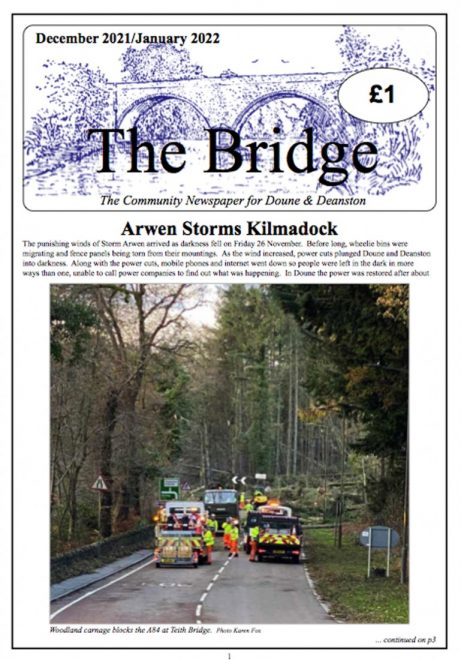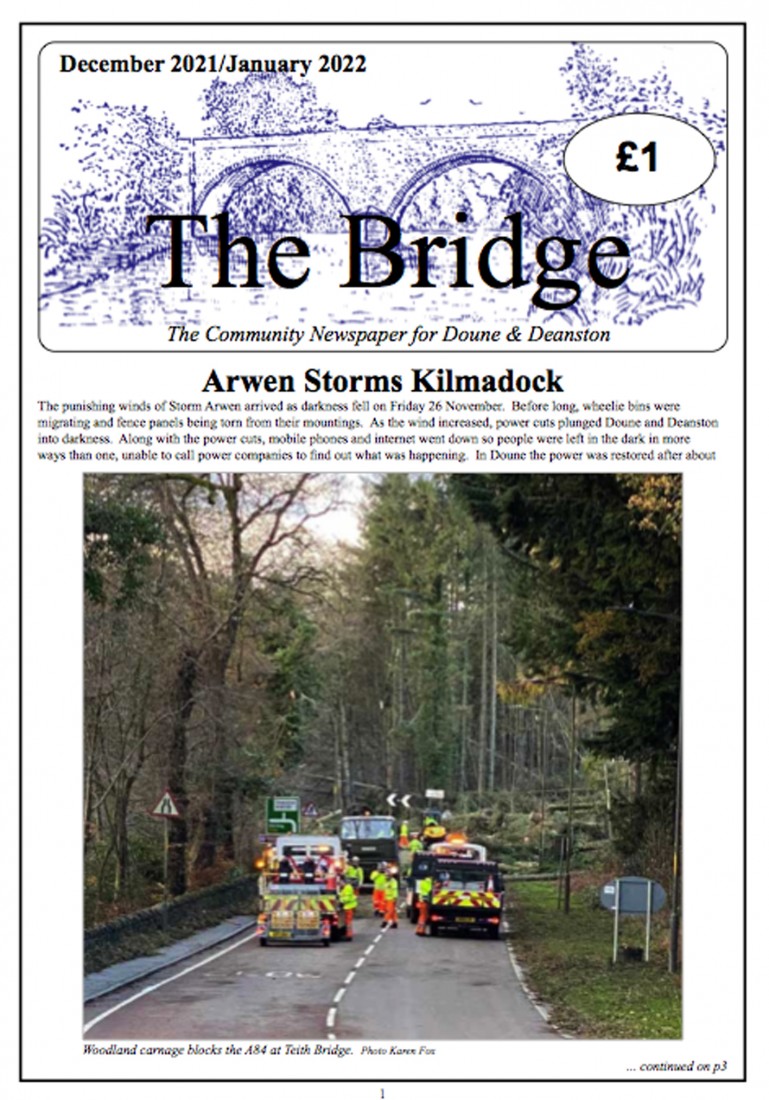
WHEN Ken Russell retired as a specialist in sedimentology and petroleum geology two years ago he promised to take things easy.
A native of Milford, he lives in the historical Scottish village of Doune near Stirling where he edits the local newspaper.
He was working his way through the layout for the February issue of the community newspaper (The Bridge) when he spoke to the Donegal News.
“I should finish by midnight but then there’s the constant interruptions with neighbours popping in for a cup of tea or to borrow tools! Roll on the quiet hours,” he laughed.
Ken started the community newspaper in October 2000 not really expecting it to last for a year, let alone still going over 20 years later.
“It’s a bit like my life in that I never really knew what I wanted to do. I’ve been so lucky and just fell into stuff that has worked out really well. I suppose you could say the harder I worked the luckier I got.
“I’m not religious but I feel really blessed with what has happened in my life. As I went through my thirties, forties, fifties and sixties life continued to get better. I’m into my seventies now and, apart from a few aches and pains, which you would expect, life is good,” he said.
He is also on the local development council and helps run the voluntary village post office.
A founding member of the Edinburgh Blues Club, he also tinkers with motorcycles in his spare time and sometimes leads groups of up to 20 bikers (dentists, lawyers and other frustrated wannabe Hells Angels) over to tour Donegal.
Doune, he explains, it similar in size to Milford “with the same amount of churches and pubs”.
He grew up on a small farm at Glenkeen outside Milford. He was exposed to the rigours of and developed an appreciation of agricultural life by helping out relatives and neighbours when needed, from an early age.
He went to the Royal School in Raphoe before going to Trinity to study arts. He completed one year before switching to geology.
“When I was seven or eight a party of geologists from Kings College, London, came over to study Donegal granite. My older brother Ronnie and I used to carry their hammers and tag along as they whacked bits off rocks and made their maps.
“I didn’t realise it at the time but a bit of that stuck and when it came to the subject of geology it was like a home from home. It would become my main breadwinner for the next fifty odd years,” he said.
“They (geologists) were staying in McGinley’s on Main Street and Duncan Ashe, one of the geologists, came up to our house to work for the season and became friends with the family,” he recalled.
After college, Ken was based in the Iveragh Peninsula, Kerry, and mapped much of South West Ireland as part of his doctorate in the 1970s – discovering fossils which were named after him (Bothriolepis Russellii).
“It was strange. Here I was – a Donegal protestant with a Northern accent – doing field work in a part of the country where people would have been quite wary of that combination. It was at the height of the Troubles but they accepted me and I spent three seasons working there,” he said of his time in Kerry.
“I found several ash beds from volcanoes while, at the same time, I started finding fish fossils and sediments deposited in the alluvial flood plains.
“Some had a very bony outer skeleton and were quite big – up one metre long. I was lucky enough to recognise them for what they were. They were taken to the National Museum of Natural History where they were named Bothriolepis Russellii.
“They date back 500 million years ago and lived during the middle to late Devonian period of the Paleozoic era,” he said.
Ken subsequently got a job with BNOC, the British National Oil Corporation, to advise on oil fields that were being discovered before the company, then known as Britoil, made half is employees redundant. He set up his own independent company Lomond Associates which took him to all four corners of the world.
“I had been looking at rough samples, retrieved by drilling, in Scotland and now I was back crawling over rocks, recording things on maps and running a couple of field crews in Bolivia. It was my dream job.
“Over the next twenty to thirty years the majority of my work was overseas, taking me across South East Asia to eastern Europe and working in Russia and Siberia.
“I continued that globetrotting until Covid started. I would be away working six weeks at a time here, there and everywhere before coming back to Doune for a week or two and then doing it all again.
“My job was to help companies who had acquired an exploration licence to try and squeeze a little extra life out of their oil fields. It’s a bit like being part of a detective story where there’s lot of evidence missing. You have to work with what information is available to you and use everything you can get your hands on,” he explained when asked for a job description.
“You need a lot of luck because you are being asked to make predictions based on very little information. You’re trying to persuade managers that a project isn’t as risky as they think it might be. You’re asking them to spend 100 million dollars drilling on a well which could turn out to be a duster. It’s a high stakes game,” he added.
The work was rewarding but involved long hours and the start of the pandemic coincided with Ken’s decision to retire.
“I’ve taken a back seat but I’m still there to trouble-shoot problems if they need a hand. I have retired but I’m now chock-a-block with all this other stuff,” he laughed.
It all started when he joined the local cricket club after moving to Doune. That led to a seat on the local council and local development trust.
He edits The Bridge, a community newspaper for Doune, Deanston and the surrounding area, which is published at the beginning of each month apart from August and January.
“I’ve still two articles to write. We’re hopeful of finding funding for a new car park and transport hub while they’re putting in a wooden bridge down by the castle as part of a new tourism trail in the village. New public toilets are opening next month. It’s all happening,” he said.
“We print 450 copies of the paper and for £1 it’s the best value around.
“We’ve a wedding back in Ireland in May and I can’t wait to bring my partner to Donegal and show her where it all started. Donegal, and Milford, will always retain a special place in my heart,” he added.











